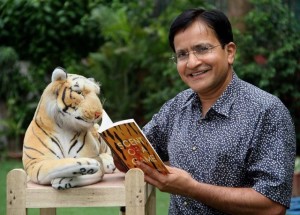Author of 'Scent of a Game’ and 'Kaali’s Daughter’, this former Secretary, Government of India is the President of The Society for Culture and Environment and the Director of Bhopal Literature Festival.
Welcome Raghavto my platform and I would like to ask you the following questions :
A few of my favorite authors are Stephen King, Jeffrey Archer, Ken Follett, Arundhati Roy, RamchandraGuha, and Yuval Noah Harari
Scent of a Game narrates the history of wildlife hunting in India and touches on the subject of illicit trafficking in endangered species while telling a very human story of a man arrested with a tiger skin near a national park. It is based around 2006, a watershed year in the annals of Indian wildlife when several prestigious and protected tiger reserves were surprisingly found to be bereft of any tigers whatsoever, quite contrary to earlier proclamations in that regard by the Forest Department.
Kali’s Daughter is about life in the civil services beginning with the selection process, the common training at the Mussoorie Academy of the Indian Administrative Service and the Foreign Serviceofficers and their later life. It describes the subtle prejudices around caste and class that are latent and mostly hidden, but are often difficult to conceal, a perplexing narrative of an Indian society in the midst of churn.
At the moment, I’m not quite sure which one will happen first, because I’m researching.
What distinguished this literature and art event from others of this ilk was its unremitting conformity to literature and art. Notably, it discussed cinema without depending on film stars to give it glamour.
Raghav :We would like to build on the momentum of the Bhopal Literature Festival first edition. More youth should want to get involved with literature for literature’s sake. Unfortunately, I have observed that even in Jaipur, despite their huge turnout from schools and colleges, student participation is mostly of a social nature. I would like to inspire the younger generations to read and expand their minds. Cinema and music is necessary, but it is all served easy, like fast food. Literature makes you think of possibilities in a far more compelling way and has to be encouraged further. It would be gratifying to see active student involvement.
Raghav : Some of the critical challenges were: Finding sponsors Building a team of capable organizers Getting the right logistics people Dealing with frequent changes in the itinerary of important speakers Getting the panelists right for any session
Raghav : Attending festivals is important. Authors are human too. Aspiring writers can meet established authors and listen to them, comprehend them – howthey respond to questions, their reactions to situations, their overall body language. Their works are extensions of their personalities and experiences and everybody has a vast gamut of unique personal experiences to build upon. So a lot can be learnt by seeing and listening to others, especially those who have been successful.
Raghav : I crave freshly squeezed orange or lemon juice. Yes, I like the tangy, citrus effect.
Raghav : Write and write. The more you write, the better you become. That will give you the flow. Also, get the broad conventions of modern writing correct by picking up a book on good writing. Most importantly, look out for topics that you will be comfortable writing about and read a lot about them. Look for unexplored areas. Facets that are not in the common domain. Build a canvas around them in your mind, and then start writing. Get your text in place. Then apply yourself to editing it, because that is as important as the basic content.
Go for it!
